
BEN CURA – ACTOR/DIRECTOR/WRITER/PRODUCER – ‘Creditors’
.
Film Courage: Where did you grow up?
Ben Cura: I was born in Argentina but my parents and I moved to Italy when I was barely one year old. From there, we moved to France when I turned six years old, traveling around the world for weeks and months at a time – we repeatedly traveled to the US and around Europe when we were living in France. We moved to Spain when I turned eleven years old and I finished going to school at the local French lyce (I’d started going to school in France). After that I moved to London where I currently live. Life at home growing up was a mix of opera, classical music, the Bee Gees, Michael Jackson and Mariah Carey, English, French, Spanish, Italian, traveling, wandering the wings of opera houses around the world – and most importantly, in and amongst all of the theatrical, show-business, globe-trotting craziness of it all, my parents did their best to raise me into a fairly normal kid. Which I still am. A kid.
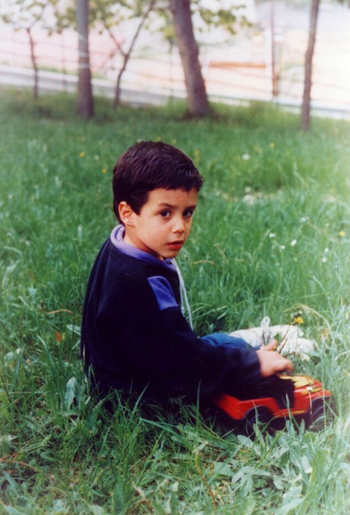
Ben Cura as a child
.
Film Courage: What are the best qualities that each of your parents taught you?
Ben: A person’s honesty, generosity, kindness, and dedication are the only things that matter. Money, material possessions, whilst they can reflect character, are only a one-sided expression of a person’s true self – a person is not defined by them – and so they are irrelevant. Hard work, passion, and investment, in anything, and everything you do, is paramount.
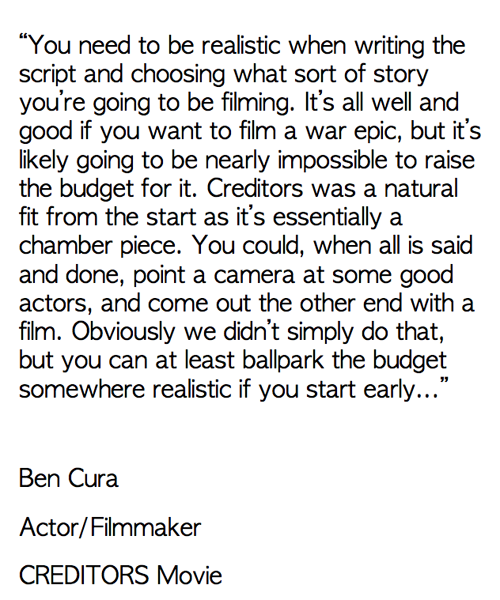
Film Courage: Did your parents lend support toward creativity or encourage another type of career/focus?
Ben: I have been very lucky to grow up surrounded by people who not only understood the nature of living a life dedicated to a creative occupation, but who also trusted the signs that their child showed them as he was growing up. You know, things like clowning around, or grabbing my mum’s camera and filming stuff, or editing clips on whatever the stock editing software was that came with Compaq PCs at the time. They nurtured that.
Film Courage: What were your plans after high school?
Ben: My plan was to train as an actor either in New York or London. I chose London after visiting the main schools in NY and being advised to train in London by the heads there. Something about tradition and them knowing how to do it properly back in England. They were right. That was some of the best advice I ever got. I applied for a place at LAMDA, RADA and Guildhall in London. I got into LAMDA and didn’t look back.

Christian McKay, Ben Cura, Ben Hecking and crew
Film Courage: What’s important in your life?
Ben: My wife. My family. My dog. Trying to focus on enjoying the present, as wanky as that sounds.
Film Courage: Are you an introvert or extrovert?
Ben: I used to be very shy, I’ve opened up more as I’ve gotten older. I like listening a lot though, so sometimes I might be more of an introvert, or at least appear to be.
Film Courage: What are your best qualities?
Ben: The listening seems to make people feel like they can talk to me. Which I love. I’m very honest too. I don’t like using politeness as a way of not saying what I mean. I’ll use it to soften the blow though – I don’t enjoy hurting people.
Film Courage: Do you listen to others advice or strictly follow your own instincts?
Ben: I think that an actor’s most important attribute – or director, writer, or anyone creative – is their gut instinct. It’s always right. Advice comes in handy when dealing with a new or unknown experience – but your gut will know whether the advice you’ve been given is valid for you or not. So it has the capacity of superseding it.

Ben Cura and Christian McKay
Film Courage: What have you learned observing your father’s opera career?
Ben: That there are many things that are out of your control, except doing what you think is right. That persistence and hard work will always yield results. And that honesty and integrity might sometimes feel like you may be giving up on what looks like a lucrative opportunity at the time, but they will be the two most important attributes that will make it so you can sleep at night.
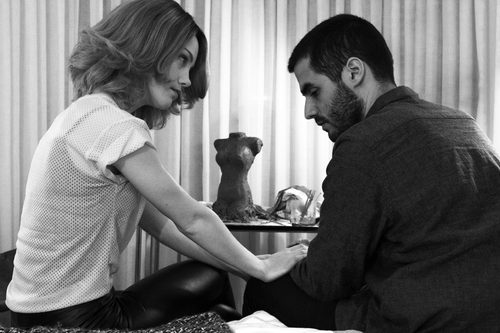
Actress Andrea Deck and Writer/Director/Actor Ben Cura
Film Courage: You based CREDITORS on August Strindberg’s 1888 play. Where were you in life when you decided to base a film on this story of a love-triangle? Do you remember the day you said yes to making it?
Ben: I was going through a very complicated relationship at the time. The story itself somehow mirrored that. But the main reason I turned it into a film was a lot simpler. I saw it being revived by Alan Rickman at the Donmar Warehouse. I loved the production, and I kept thinking about it, until I sat down and started adapting it. It took more than five years to get from that moment to the film’s world premiere in New York. Wow. Where has all that time gone.
Film Courage: What does CREDITORS say about the world we live in?
Ben: People need faith. Whether it be faith in themselves, another person, religion, or whichever other story they’ve picked out or created for themselves in order to make sense of the world. We cannot live alone, and yet we are alone by default. Alone in a chaotic, confusing, brutal world. But a beautiful one nonetheless.
Film Courage: How long did it take you to write the first draft?
Ben: It took me about 7 months to come up with the first draft. There were countless rewrites after that. Too many to remember. I know at one point – I kept all of the drafts I printed – and the stack of scripts under my desk was about two feet high.
Film Courage: How many people did you share the script with during the writing process?
Ben: Simon Callow, who plays John Allen in the film, was extremely helpful with the whole thing. He read the script a few times at different points in the adaptation process, and we talked about it over dinner afterwards. Each time, I went back to it with a spring which had somehow been re-sprung. I sat down with Alan Rickman a few times as well, and whilst his vision of the play had already been expressed in his fantastic revival at the Donmar (which he also took to NYC at the BAM), he did shed a light on some of the discussions he and his cast had had about the characters during rehearsals. That informed some of the action which is set in the past in the film.
Film Courage: How long did it take to finish the script?
Ben: I started the adaptation process in December 2010, and the script kept evolving until April 2014. So four years, not including the rewrites which naturally occur when you’re on set.
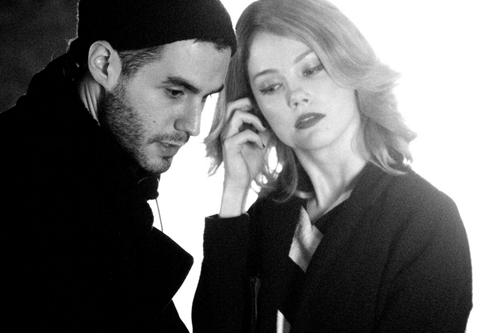
Ben Cura and Andrea Deck
Film Courage: We often hear from people about the lack of original stories in the world. How did you keep CREDITORS modern and fresh?
Ben: Creditors, the play, exists in and of itself as its own work, and it’s a masterpiece. Creditors, the film, is a different beast. The settings are different, the characters are different. The core story, which is all Strindberg, remains. But the freshness and originality lie in the way it’s been told. Starting with the script, all the way down to the edit and sound design, the photography and acting choices, the settings. The collective effort expressed in filmmaking is a different beast to that found in the theatre. Not to mention, what is said in words in the play, has been told – hopefully effectively – in a more visual way in the film. Also, there are themes which, explored in the play’s original 1888 timeframe, have been fundamentally modernized in the film. But that is an entirely different discussion to be had another time.
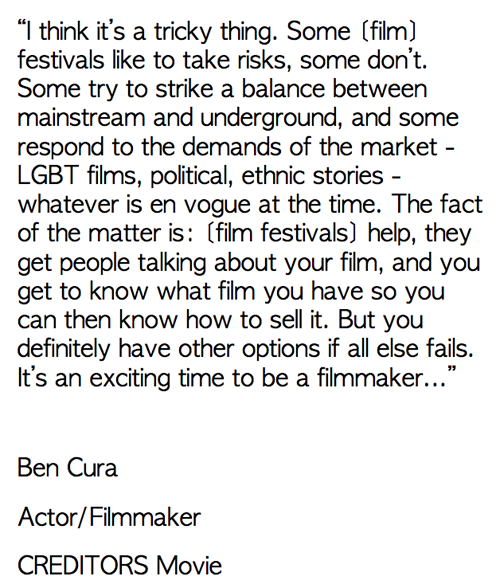
Film Courage: How long have you been planning the film?
Ben: Originally, the idea was to film it all on Osea Island, in Essex. We did film part of the action there, but it ended up being a secondary location as opposed to the main one. We went on a recce of the island in the summer of 2012, which was great. It’s a beautiful location. Budgeting the film was then another challenge. We originally thought we’d be able to film it with a bigger budget than what it turned out to be, so the planning and research organically changed as it became apparent we needed to think creatively and downsize.

Ben Cura on set
Film Courage: For CREDITORS, did you come up with a film budget first (based on your resources available) before coming up with idea? Or was it the other way around of having the idea first?
Ben: You need to be realistic when writing the script and choosing what sort of story you’re going to be filming. It’s all well and good if you want to film a war epic, but it’s likely going to be nearly impossible to raise the budget for it. Creditors was a natural fit from the start as it’s essentially a chamber piece. You could, when all is said and done, point a camera at some good actors, and come out the other end with a film. Obviously we didn’t simply do that, but you can at least ballpark the budget somewhere realistic if you start early.
Film Courage: How did you calculate what the budget was going to be?
Ben: The way you would normally budget a film – first. Then get rid of non-essentials. Then squeeze a little tighter and think creatively. Then be lucky and have people fall in love with the project and get on board for a quarter of their normal fee. That’s when they also need to get behind you as a person, not just the project itself.

Andrea Deck and Tom Bateman
Film Courage: You had a Kickstarter campaign which was launched for $200k, but canceled by you 9 days before the campaign date?
Ben: Because we weren’t going to make it, and canceling the campaign was a public acknowledgement that we had underestimated what needed to be done to raise that budget, and overreached our goal on Kickstarter. We then launched a second campaign, raising much less money, but successfully. You fall off the horse, you get back on it again. You’re wiser when you do, too.
Film Courage: How did you raise your budget?
Ben: The main investment was put in by a company called Cuibar in Spain, which has been producing classical music recordings, concerts, operas and live films for over fifteen years. A branch of it manages my father too, so that was my in. They agreed once they saw it was doable, and that the budget had been considerably lowered. We then had some very generous private donations by individuals across the world, who believed in the project and wanted to see it happen. Then, as I mentioned before, we raised some more money with a second Kickstarter campaign, which was successful.
Film Courage: Did you scale back on certain scenes/location to meet the new budget?
Ben: The main scale back, which eventually turned out to be an asset, was filming in Spain. The hotel location – and particularly the church – were borne out of necessity, and ended up being much more exciting than the original locations we’d planned on a bigger budget.
Film Courage: How long did it take to finish the film?
Ben: If you start counting from the moment we started filming the very first bit of footage, 15 months.
Film Courage: Is CREDITORS the first feature film that you’ve directed? How did you organize your time, your day and keep yourself on track as a director and actor? What tips can you share for other filmmakers who are also writing and directing a movie in which they also act?
Ben: This is a biggie. So, yes, Creditors is my debut as a director, screenwriter and producer. I naturally am very organized by default, and keep checklists, reminders, calendars, notes, of most things I do in normal life. So making a film where you’re multitasking is essentially that – but on crack, with a side of speed, and a couple shots of espresso. With regards to my directing, I went in with my instinct, and used my experience being in front of the camera when it came to working with my crew, and being directed by different directors when it came to working with my actors. You learn a lot by just being on set as an onlooker – when you’re an actor, you are an active part of the process, and an onlooker at the same time. But I’ve been passionate about film since I can remember – and I trained as an editor before training as an actor. When it came to acting and directing Creditors, some days I had five pages of dialogue, and had to go in and rehearse the scene with my actors and myself, show it to the crew, pick the coverage with my D.O.P, wait for him to light it, then shoot it. So really, once you get in the swing of things, and you have a clear way of working through scenes, it’s not as difficult as it first sounds. You’ll also be amazed about how quickly you can learn five pages of dialogue when you are running out of money, time, and you need to move on to a different location and learn five more pages on the way there.
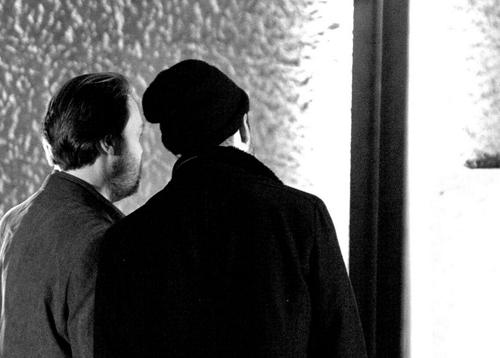
Christian McKay and Ben Cura
Film Courage: What surprises came up for you on set as a first time director that you’ll try another way next time?
Ben: I would not make another film without a line producer. They are an essential part of a production running smoothly. The next thing, and this is also part of growing up as a human being – I was 24 when we filmed Creditors – is to remember that no one else has set the bar as high as you have set it for yourself, and that you should not expect people to display the same passion and commitment as you in everything they do. Once you realize that, you can then adapt the way you work to minimize the stress and disappointment you may feel, and may cause others to feel too.
Film Courage: How did you pitch the script to your actors?
Ben: “Read it. Do you want to play this part?”
Film Courage: You have amazing talent attached to CREDITORS. How did you know beforehand you had the right actors for the role?
Ben: Annie came in after I had already gotten Christian McKay and Andrea Deck on board. She was fantastic at helping me cast the rest of our actors. Christian and Andrea loved the script. Originally the part Andrea plays is meant for a more mature woman, but as I said before, our film explores Strindberg’s story through different avenues. So making everyone’s age closer to our own made it so that Christian was then a perfect fit for Grant. He read the script, loved it – and liked the challenge of playing the part. We shook hands one evening – I’m in. And that was that.
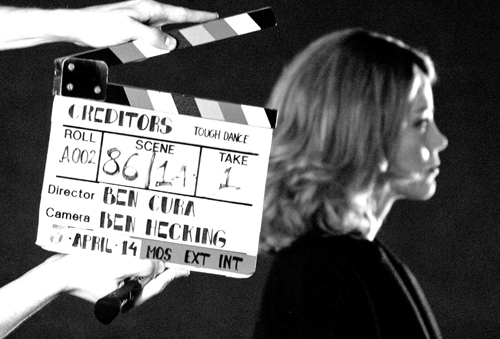
Andrea Deck
Film Courage: What camera(s) did you use? And lens package?
Ben: Our main camera was a Canon C300. We shot all of the present footage with that camera. We also used 5D Mark IIs, 650Ds, GoPros and even an iPhone at one point. I let my D.O.P. Ben Hecking choose the right glass according to what he felt he needed. Bear in mind a lot of the action was filmed indoors, so we rarely whipped out a 100mm or 150mm lens.
Film Courage: Is the film strictly in black and white? Can you tell us the decisions behind this choice?
Ben: We shot all of the action set in the past – which is only five percent of the film, if that – in color, but then I decided to film the rest in black and white. What that means is that things like the way the film was lit, had to be re-assessed. Ben Hecking cleverly rethought the way he took care of light and shadows in order to produce proper, contrasting black and white. But the consideration didn’t just end there – that’d be lazy. When you work in monochromatic tones, costume becomes less about color and more about texture. So Kara Colbeck, our costume designer, showed me all these costume options which were all about patterns, and contrast of greys and whites – which are things which were also considered when it came to the art department and dressing the sets. Make up, too, became about texture and using tones in a different way than you would if you were filming in color – suddenly, a certain kind of lipstick, which may look striking in full color, is bland in black and white. So we looked at the way make up was applied in older, black and white movies. In a way, it was a lovely way to revisit certain concepts you don’t get to work with that often, given the majority of new films are shot in color. Why did I choose to film in black and white? It made sense to me at the time. And I don’t regret it.
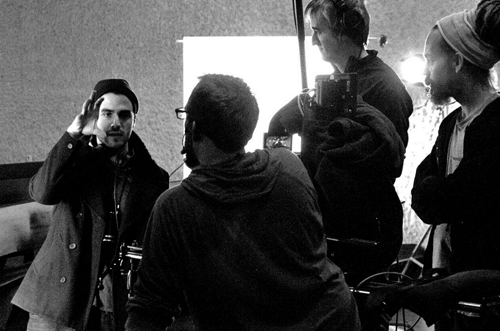
Ben Cura, Ben Hecking and Crew
Film Courage: Can you share a difficult day on set? What would you change?
Ben: There is a moment when you need to stand in front of your cast and crew, and you have to go over the twelve hour shooting day you’ve just had with them by three more hours, and it’s already two in the morning, and everyone is tired, and they have been through a 6-day week, and you are begging them to understand the limitations of your budget, cast and location availability, and power through, otherwise you won’t have a film. And it feels horrible, because you understand them, and sympathize with the way they feel, but you also need to finish your film.
.

.
Film Courage: Do you have any upcoming screenings for CREDITORS?
Ben: So the film will have its world premiere at the Nordic International Film Festival in NYC on October 31st at 6.45pm. We’ll also be screening it at the Anchorage International Film Festival in Alaska. That’ll be held December 4-13. Those are the ones confirmed for now.
Film Courage: Do you feel film festivals are beneficial for filmmakers?
Ben: I think it’s a tricky thing. Some festivals like to take risks, some don’t. Some try to strike a balance between mainstream and underground, and some respond to the demands of the market – LGBT films, political, ethnic stories – whatever is en vogue at the time. The fact of the matter is: they help, they get people talking about your film, and you get to know what film you have so you can then know how to sell it. But you definitely have other options if all else fails. It’s an exciting time to be a filmmaker.
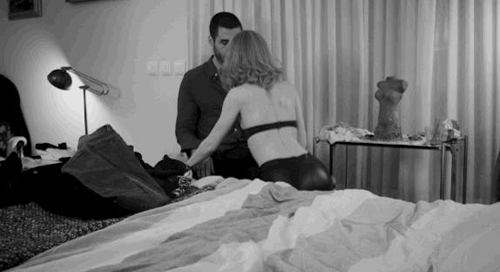
Ben Cura and Andrea Deck
Film Courage: Where is CREDITORS currently available to watch?
Ben: Festivals only for now. So head on over to our Twitter, Facebook or subscribe to our Newsletter. We’ll be letting people know about which festivals they can go see it at.

Ben Cura and Christian McKay
Film Courage: Do you want to write/direct/produce and act in the same film again?
Ben: Absolutely. Maybe take a back seat on the producing side of things, but I love the creative challenge of being both in front and behind the camera.
Film Courage: What do you envision for yourself 5 years from now?
Ben: Hopefully healthy, happy, wiser.
Film Courage: What’s next for you creatively?
Ben: I’m writing this on a plane back from Ibiza where I just finished playing a cop in a British film. There’s more film and TV as soon as I touch down in London, but I can’t say much about that yet. When it comes to the next film I want to direct? I have been working on something – bigger in scale than Creditors – set in both Argentina and the UK. That’s all I’ll say about that for now.
BIO:
Ben Cura (Freddie Lynch / Director / Writer / Producer)
Ben made his film debut in British Indie Comes a Bright Day. He also appeared in Comedy Central’s series Threesome, Bernard Rose’s film The Devil’s Violinist and Danny Boyle’s Trance.
He made his West End debut playing Angel in the original cast of Jennifer Saunders’ musical Viva
Forever! at the Piccadilly Theatre in London’s West End.
He was later cast as Seve Ballesteros in British film Dream On. He also starred in the UK premiere of Geoffrey Nauffts’ play Next Fall at the Southwark Playhouse. He was later cast as a new recurring character in season 2 of E!/Lionsgate series The Royals, premiering November 2015. He later went on to star in feature film A Bus Could Run You Over alongside Billy Zane and directed by Ben Turner.
Creditors is Ben’s debut as a director, as well as his debut as a screenwriter, which he both undertook at age 25. He is also a producer on the film.
SYNOPSIS:
Grant Pierce (Christian McKay) arrives from London into Madrid, Spain, hoping to be given the chance to meet his favorite painter, American Freddie Lynch (Ben Cura), who is currently staying at a private hotel in an unassuming location outside the city. As Grant steps into the main building of “El Madro,” he troublingly finds Lynch a crippled man whom, he soon reveals, has been unable to actually paint for the better part of a year.
As the two men get to know each other under the watchful eye of one of the owners of the hotel, Michael Redmane (Tom Bateman), they start to piece together the disturbing picture of Freddie’s marriage to beautiful writer Chloe Fleury (Andrea Deck) which harbours secrets that will reveal much more than Freddie’s recent creative emaciation and clearly defined obsession with her ex-husband.
Based on August Strindberg’s 1888 play, “Creditors” is a modern re-telling of Strindberg’s story of love, betrayal, revenge and psychological manipulation, which he considered to be his one true masterpiece.
At times disturbingly funny and cruelly bleak, “Creditors” deals with the most private aspects of human relationships. From questioning our concepts of marriage and fidelity, to trying to establish the role of the modern woman in a world still trapping her within the confines of old fashioned canons, the film’s story stirs, moves and sometimes even angrily rebuts our very own personal definitions of each.
LOGLINE:
A love triangle is unraveled when a young painter is approached by an admirer who eases him into making sense of his relationship with his wife.
CONNECT WITH CREDITORS MOVIE:
Official Website
Twitter
Facebook
Instagram
Youtube
IMDB
Screening info at NIFF
























